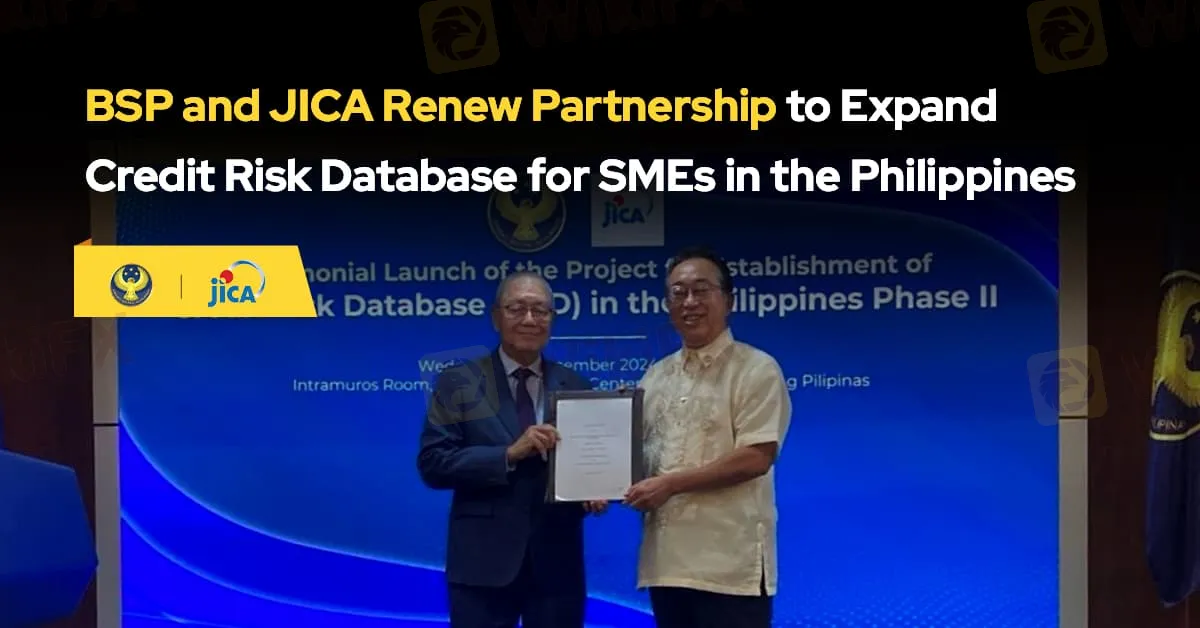BSP and JICA Renew Partnership to Expand Credit Risk Database for SMEs in the Philippines
abstrak:On December 11, 2024, a significant milestone was reached in the Philippines' financial sector as the Bangko Sentral ng Pilipinas (BSP) and the Japan International Cooperation Agency (JICA) officially signed the ‘Records of Discussion’ for the second phase of the Credit Risk Database (CRD) project. The ceremony at the BSP headquarters in Manila marked a pivotal moment in widening access to financing for small and medium enterprises (SMEs) across the country.

On December 11, 2024, a significant milestone was reached in the Philippines' financial sector as the Bangko Sentral ng Pilipinas (BSP) and the Japan International Cooperation Agency (JICA) officially signed the ‘Records of Discussion’ for the second phase of the Credit Risk Database (CRD) project. The ceremony at the BSP headquarters in Manila marked a pivotal moment in widening access to financing for small and medium enterprises (SMEs) across the country.
BSP Governor Eli M. Remolona, Jr., and JICA Philippines Chief Representative Sakamoto Takema attended the signing. They both emphasized the partnership's importance in supporting the growth of SMEs, which are the backbone of the Philippine economy. Minister of Economic Affairs NIHEI Daisuke from the Embassy of Japan also witnessed the signing.
Expanding Financial Inclusion
The CRD project aims to revolutionize access to finance for SMEs by generating a credit score that financial institutions can use to assess an SMEs ability to repay loans. This credit score system enables banks to implement risk-based lending practices, reducing the need for collateral while broadening access to financial services for SMEs. This is especially important in a country where many small businesses struggle to secure loans due to the lack of traditional credit histories or collateral.
Governor Remolona expressed his confidence in the project's ongoing success, stating, “As we end Phase 1 and move on to Phase 2, I know we will all sustain the momentum weve built. Let us continue to work together to help SMEs and improve the quality of life of Filipinos.”
JICA's Chief Representative Takema echoed this sentiment, emphasizing the collaborative success between the two organizations: “We are witnessing the commencement of the 2nd phase of our CRD project. It is instrumental to the [project‘s overall] success and reflects the continued trust between BSP and JICA to further develop what has been achieved through the 1st phase of the project. Let’s continue to work together for a prosperous and inclusive development of the Philippines with CRD.”
From Phase 1 to Phase 2
The CRD project, which began in 2020, has made significant strides during its first phase. In this initial phase, BSP and JICA successfully developed both the SME database and a credit-scoring model and tool. By October 2023, the credit-scoring tool had already been deployed to participating financial institutions.
With the launch of Phase 2, the project will transition to permanent operations, and the two organizations will explore the development of new services to further enhance SMEs' access to finance. The next steps include refining the credit-scoring tool, expanding its use across more financial institutions, and integrating more SMEs into the database.
Key Participating Banks
The first phase saw several major financial institutions participate in the CRD project, including the Land Bank of the Philippines, Development Bank of the Philippines, Security Bank Corporation, and Rizal Commercial Banking Corporation, among others. Several additional banks have since joined the initiative, including the Bank of the Philippine Islands, Metropolitan Bank and Trust Company, Philippine National Bank, Maybank Philippines, and many more. The expanding list of participants reflects the growing recognition of the CRDs potential to improve lending practices and financial inclusion in the Philippines.
A Promising Future for SMEs
The renewed partnership between BSP and JICA highlights the crucial role that SMEs play in the Philippine economy and the importance of innovative financial solutions to support their growth. By continuing to develop the CRD project, the BSP and JICA are helping to create a more inclusive financial ecosystem that allows SMEs to thrive, which in turn contributes to the broader economic development of the country.
As both organizations move forward with the second phase of the CRD project, the Philippines is poised to see a more equitable and efficient credit market, one that helps SMEs access the financing they need to grow, innovate, and contribute to the countrys development.
The collaborative efforts between the BSP and JICA are an exemplary model of how public-private partnerships can drive sustainable economic growth and financial inclusion, especially for sectors like SMEs that are essential to a countrys economic health.

Broker ng WikiFX
Exchange Rate

